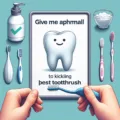The Importance of Gentle Dental Care
We all want a bright, healthy smile. But in our enthusiasm for good oral hygiene, many of us may be brushing our teeth too vigorously. While regular brushing is essential, overbrushing can actually damage your teeth and gums over time. This article will explore the signs of brushing too hard and provide gentle alternatives to keep your smile radiant without causing harm.
Understanding Overbrushing
Overbrushing, also known as toothbrush abrasion, occurs when we apply too much pressure or use overly hard bristles while brushing our teeth. It’s a common misconception that brushing harder leads to cleaner teeth. In reality, gentle, consistent brushing is far more effective and less damaging.
Many people overbrush without realizing it, often due to stress, habit, or a misunderstanding of proper dental care techniques. By becoming aware of the signs and adjusting our habits, we can protect our oral health for years to come.
Signs You May Be Brushing Too Hard
If you’re concerned about overbrushing, look out for these telltale signs:
- Receding gums: If your gums are pulling away from your teeth, exposing more of the tooth surface, this could be a sign of overbrushing.
- Sensitive teeth: Excessive brushing can wear down tooth enamel, leading to increased sensitivity to hot, cold, or sweet foods and drinks.
- Bleeding gums: While occasional bleeding can occur, frequent bleeding during brushing may indicate you’re being too rough.
- Frayed toothbrush bristles: If your toothbrush bristles splay out quickly, you might be applying too much pressure.
- Notches near the gum line: These indentations on your teeth can be caused by aggressive brushing over time.
The Impact of Overbrushing on Oral Health
While it may seem counterintuitive, brushing too hard can actually harm your oral health. Here’s how:
- Enamel erosion: Vigorous brushing can wear away the protective enamel on your teeth, leading to increased sensitivity and vulnerability to decay.
- Gum recession: Overbrushing can cause your gums to recede, exposing the sensitive root of your tooth and potentially leading to loose teeth.
- Increased risk of infection: Receding gums create pockets where bacteria can accumulate, increasing the risk of gum disease and other oral infections.
- Cosmetic concerns: Over time, overbrushing can change the appearance of your smile, potentially leading to discoloration or an uneven gum line.
Gentle Alternatives for Effective Brushing
The good news is that with a few simple adjustments, you can maintain excellent oral hygiene without risking damage from overbrushing:
- Use a soft-bristled toothbrush: Soft bristles are just as effective at cleaning your teeth and are much gentler on your gums and enamel.
- Apply gentle pressure: Let the bristles do the work. Use light, circular motions rather than aggressive back-and-forth scrubbing.
- Time yourself: Brush for two minutes, twice a day. This ensures thorough cleaning without overdoing it.
- Consider an electric toothbrush: Many electric toothbrushes have pressure sensors that alert you if you’re brushing too hard.
- Focus on technique: Angle your brush at 45 degrees to your gums and gently brush in circular motions.
- Be mindful: Pay attention to how you’re brushing. If you catch yourself applying too much pressure, consciously relax your grip.
The Role of Compassionate Self-Care in Oral Hygiene
Oral health is an important aspect of overall well-being, and it’s crucial to approach it with kindness and self-compassion. Remember, the goal of brushing isn’t to scrub your teeth as hard as possible, but to care for them gently and consistently.
If you’ve been overbrushing, don’t be hard on yourself. It’s a common habit that many people develop unknowingly. Instead, view this as an opportunity to develop a more nurturing relationship with your oral health routine. Treat your teeth and gums with the same gentleness and care you would show to any other part of your body.
By adopting a more mindful approach to brushing, you’re not just protecting your teeth and gums – you’re also practicing self-care and developing habits that contribute to your overall health and well-being.
Frequently Asked Questions
1. How often should I replace my toothbrush?
It’s recommended to replace your toothbrush or electric toothbrush head every 3-4 months, or sooner if the bristles become frayed or worn.
2. Can overbrushing cause tooth sensitivity?
Yes, overbrushing can wear down tooth enamel and expose dentin, leading to increased tooth sensitivity to hot, cold, and sweet stimuli.
3. Is it possible to reverse the effects of overbrushing?
While you can’t regrow lost enamel, adopting gentler brushing habits can prevent further damage. In some cases, receded gums may naturally reattach to teeth once the trauma of overbrushing stops.
4. Should I brush my teeth immediately after eating?
It’s best to wait at least 30 minutes after eating before brushing, especially after consuming acidic foods or drinks. This allows time for your saliva to neutralize acids and remineralize your teeth.
5. Can using mouthwash replace brushing or flossing?
No, mouthwash is a supplement to, not a replacement for, brushing and flossing. While it can help freshen breath and kill bacteria, it doesn’t remove plaque as effectively as mechanical cleaning methods.
Remember, gentle, consistent care is the key to maintaining a healthy smile. By treating your teeth and gums with kindness, you’re investing in your oral health and overall well-being for years to come.









